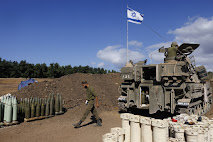Hezbollah vs Israel: A New Conflict. Updates up to 10 October 2024
Hezbollah vs Israel: A New Conflict. Updates up to 10 October 2024
Tensions between Hezbollah and Israelis have once again reached a new level, and the violence across the Lebanon-Israel border has gone unprecedentedly high. In the recent trend, frequent rocket attacks, airstrikes, and military exercises have often taken place around the region, threatening to escalate further the volatile situation of the area.
History of Conflicts
Hezbollah is a Lebanon-based, Shiite militant group which has fought against Israel for decades. Strongly aligned with Iran and influential in Syrian and Lebanese politics, it is an important player within a larger Middle East geopolitical order. Hezbollah, according to Israeli sources, possesses over 150,000 missiles of various ranges, some of which can reach deep inside Israeli territory.
Since the 2006 Lebanon War, Hezbollah and Israel have continued performing "exercises" periodically, though the situation is still calm, and provocations are relatively rare. The current war is one of the gravest conflicts between the parties amidst the larger regional tension.
Recent Events (October 2024)
In the latest round of the violence, Hezbollah has fired a succession of rocket barrages into northern Israeli towns and military installations from southern Lebanon. Israel has retaliated with intense airstrikes and artillery bombardments against Hezbollah's infrastructure, including command centers, missile depots, and communication facilities.
Some of the key developments in the conflict currently include:
Increased Rocket Fire:The Hezbollah stepped up rocket fire significantly, firing more than 500 rockets into Israel in the last week. While most of the rockets were intercepted by the Iron Dome missile defense system of Israel, several managed to cause damage in civilian centers, resulting in loss of life and property damage.
The Israeli military has responded by continuing a string of airstrikes in southern Lebanon on Hezbollah military assets. Israel has also reinforced defenses on the border through the positioning of more troops and equipment in anticipation of a possible ground invasion.
Civilian Casualties:
The civilians, both across the border, were the worst sufferers of the increasing violence. The Israeli air strikes have already forced hundreds of families in Lebanon out of their houses, while Israel's rocket attacks on some towns have already started injuring people and compelling thousands to take shelter in bomb shelters. International humanitarian agencies have condemned the growing civilian casualties and possible humanitarian disaster.
This conflict bears larger implications for the region. Hezbollah is now seen as part and parcel of Iran's policy to force Israel to yield under international pressure, following the failure of nuclear talks with world powers. Israel is equally keen not to let Hezbollah turn into a more forceful military power.
The Global Response
It is indeed very true that the global community has been keenly observing the conflict, as calls for restraint on both sides have also emerged. The United Nations urged both warring parties to an immediate ceasefire, but so far, nothing much has come from the diplomatic efforts. As the clock ticks on, some key players, such as the United States and the European Union, have condemned Hezbollah's attacks, even as they extend support to Israel's right to self-defense.
What's Next?
Fears are deepening that the situation might eventually deteriorate into war as the conflict unfolds. With the airstrikes, Hezbollah issued a warning that it would carry out more actions in its threat after any additional airstrikes. Israel responded with a warning, saying it was not at liberty to shy away from defense as it seeks to protect its people.
As both of them appear dug in, international diplomacy may yet salvage a solution before the fight spreads to engulf an ever-wider conflagration. For now, all of the region holds its breath, and over the coming weeks, it is the next chapter that defines the new course for the Hezbollah-Israel war.
Conclusion
Renewed hostilities between Hezbollah and Israel remind the world of how fragile the balance in the Middle East remains. At this point, if not already, the international community is in a position where it is forced to challenge the crisis to prevent it from propelling into an all-out region war.
This moment requires immediate steps toward ceasefire and return to some semblance of peace with civilians taking the brunt of the violence.






Comments
Post a Comment